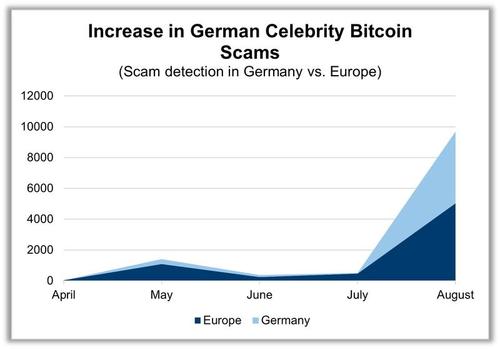
Celebrity Bitcoin scams are on the increase, and Germany is one of the primary countries being targeted, according to data gathered by The Media Trust. These bitcoin scams target publisher websites with ads featuring celebrity photos and sensationalist headlines, which, when clicked, redirect users to dubious solicitations for bitcoins. For in-depth information on these celebrity bitcoin attacks, read our Digital Trends: August 2020 report.
With over twice as many Celebrity Bitcoin scams detected in August 2020 compared to previous months, these attacks (sometimes referred to as “Fizzcore”) harm publishers in two ways:
- Site visitors clicking on this malicious content will have a very poor experience, including financial loss if they invest in the bitcoin scam. Poor user experiences translate into less website traffic and lower advertising revenue.
- Publishers will be at risk for regulatory fines and possible class action lawsuits, since the bad actors behind these scams are accessing sensitive personal information, including credit card details.

Examples of Successful Attacks
In the bitcoin scam below, you see tennis legend Boris Becker’s photo with a provocative headline (“Tragedy Stroked Switzerland!”) and a prompt to continue reading. This ad appeared on a popular sports website. Once you click on the ad it takes you to a scam landing page touting an opportunity you should not pass up. This ad was presented to website visitors in several countries, including Germany. This is a classic version of a Celebrity Bitcoin scam.

The scam ad below was detected on a German news website, and uses more text-based creative to avoid detection. The ad then takes you to a compromised landing page. This ad features a photo of Walter Kohl, a financial analyst and author and son of the former German Chancellor Helmet Kohl.

Celebrity Bitcoin Attacks Difficult to Stop
Over the last several years, Celebrity Bitcoin attacks have become increasingly difficult to identify as the ad creative itself bypasses standard quality checks from major ad serving companies. Bad actors are using text-based ads to avoid detection, and in some cases gather personal information and then contact the consumer via the phone to make a hard sales pitch. These ads use celebrity photos to entice website visitors to click through to the story, which appears to be legitimate content.
As these attacks increase, defending against them becomes critical. Publishers will need to take a number of steps to be successful, including reviewing landing pages, updating their ad quality policies to consider Celebrity Bitcoin scams, and monitoring their websites on a continuous basis. For a more complete review of the steps needed to prevent these attacks, see “Defending against successful attacks” in the Digital Trends: August 2020 report.



